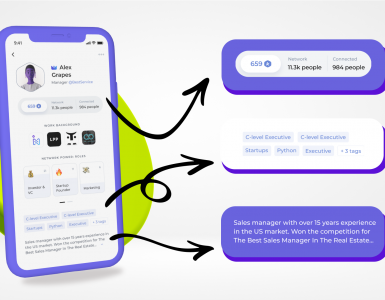The quality of your pitch is a critical part of getting traction and growing your company.
The startup pitch is one of the most important skills you can develop as a founder. It’s easy to think of how important it is to know how to code or build products — but being able to make a good pitch is just as indispensable. You need this skill if you want your company and idea to succeed.
At Intch, the AI-powered networking app, many founders are looking to pitch their startups, but they face questions like: How does one go about making a pitch? And what makes a good pitch? In this article, we’ll examine these questions and more.
What is a startup pitch?
A startup pitch is an attempt by a founder to communicate their business idea to potential investors, clients, partners, or even employees. The most common purpose of the pitch is to get money from investors in exchange for equity in the business. When founders try to raise capital from angel investors or venture capitalists, they are making a startup pitch.
In short, any time you’re trying to close a deal, whether it’s attracting a new hire or landing a Series A funding deal, you’ll need to pitch your startup. While pitch decks are commonly used, a startup pitch can be entirely verbal, such as over a phone call.
How should a startup pitch be organized?
There are many different ways you can structure your pitch, but there are some important concepts that you should consider:
- Finding the right audience
- The elevator pitch
- Making a compelling story
- Avoiding common mistakes
Let’s explore each of these areas.
How do you find the right audience?
Finding a curated group of investors that are relevant to you is an important part of the process. Startups often use investor networks, such as AngelList’s syndicate or YCombinator’s alumni network, to build their investor base. You can also target specific investors by geography or industry, which helps you hone in on exactly who you want to hear from when crafting your pitch.
With Intch, you’ll see a curated feed of potential contacts, with whom you share common elements, such as background, interests, and goals. You can even sort specifically for “VCs looking for startups” to ensure that you’re targeting the right audience.
What is the elevator pitch?
The elevator pitch is a short summary of your company — and it typically takes about 15 seconds to say everything you need to say about the business. The idea is for investors to get an overview of what you do in as little time as possible.
YCombinator is a world-class startup incubator and accelerator. YCombinator offers plenty of helpful advice for startup pitching, such as that “a great pitch is one where you can tell it to your mom and she gets it.” This means that you need to do much more than just talk about your company — you need to be able to explain it in a clear and concise way.
You should also be prepared for a wide variety of questions. Investors will want to know about your team, the problem you’re solving, how you plan to execute that solution, and what makes you and your company different from other startups in the same space.
Doing well at YCombinator isn’t easy — only 1.5% to 3% of companies that apply make it through their rigorous process to become accepted. And if you don’t, there are plenty of opportunities online to build networks as well.
How do you tell a compelling story?
A good story makes us interested in what happens next and keeps us engaged throughout the entirety of your pitch. So, first, make sure that all of your points tie back into a central theme or message that connects them together into a cohesive whole. Second, make sure that each point builds on previous ones (and doesn’t contradict them).
Finally, make sure that there’s nothing boring about your story! Boring stories don’t hold our attention, so keep things interesting — with lots of action verbs and colorful language.
What are some common mistakes founders make?
One of the most common mistakes founders make in their pitch is focusing too much on the product. While it’s important to highlight how your product works, you should also spend time highlighting the problem that you’re trying to solve and how your startup will solve that problem.
Another common mistake is failing to communicate their passion and enthusiasm for their startup. This is especially important when speaking with investors, as they’ll be able to tell if you’re truly passionate about your business or just going through the motions. This is also reflected in the vision and mission statements that you include in your business plan.
Lastly, many founders fail to properly structure their pitch. It’s important for your pitch to have a logical beginning, middle, and end, so that it flows smoothly and doesn’t feel like a jumble of words thrown together without any order.
Avoiding these mistakes can help you stand out to investors; however, if you’re talking with the wrong type of investor, then even a perfect pitch will fall flat. That’s what makes finding curated investor networks so important — and why Intch is the perfect place to start.








It seems like you need to have different versions of your pitch ready for different audiences and contexts — one for verbal calls with investors, one for employees, more formal written ones, etc. Good to know.
15 seconds for an elevator pitch! That seems so short! Ah well, I guess that’s the next challenge.
Highlight the problem and don’t focus too much on the product – got it! Seems counterintuitive but that makes sense. You have to show why your product is important before getting into the details of how it works.